Ah, the warm embrace of a loyal pet. The joyful wagging tails, the playful purrs—these are the moments that make life truly worthwhile.
But lurking within this idyllic companionship lies an age-old adversary: fleas. These tiny, blood-sucking parasites have been causing havoc for pets and households since time immemorial.
From incessant scratching and discomfort to potential health issues like flea allergies or even anemia, fleas can quickly transform our furry friends into miserable creatures. Moreover, these pests are notorious for their resilience, adept at infiltrating homes and multiplying with alarming speed.
Unraveling the Secret to Flea-Free Bliss: Essential Oils as a Natural Alternative
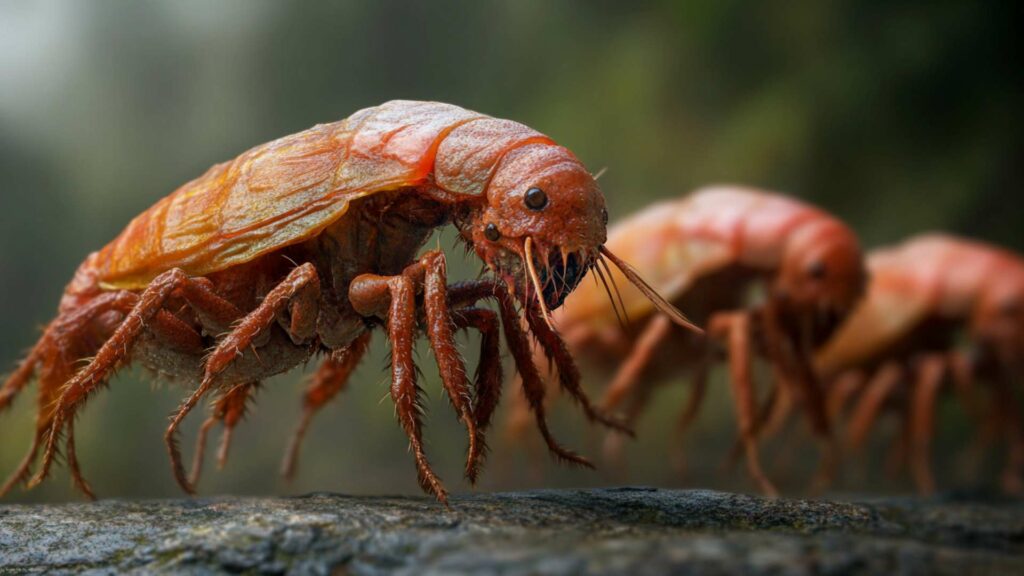
Amidst the chaos of flea outbreaks, it’s essential (pun intended) to explore safe and effective remedies that steer clear of harmful chemicals. Enter essential oils—the age-old elixirs derived from various plants renowned for their therapeutic properties. While they have enchanted us with their captivating aromas in perfumes and candles, few know about their potential in repelling fleas naturally.
The concept of using essential oils as flea control is gaining traction among pet owners seeking alternative solutions to safeguard their beloved companions from these persistent pests without exposing them to toxic substances found in conventional flea treatments. Not only do many essential oils repel fleas thanks to their potent scents; but some also possess insecticidal properties that can eliminate these unwelcome critters entirely.
By harnessing the power of nature through the best essential oils around, we embark on a journey towards creating a harmonious environment where our pets can frolic freely without fear of becoming a feast for fleas. So, let’s delve into this aromatic world where basil oil, peppermint essential oil, rosemary oil, and more can become our allies in the war against fleas.
Benefits and Drawbacks of Essential Oils for Flea Control
The Natural Charm: Advantages of Essential Oils Over Traditional Treatments
Now that we’ve set our sights on essential oils as natural flea repellents, it’s crucial to understand the advantages they offer compared to chemical-based alternatives. One of the primary benefits is their eco-friendliness.
Unlike conventional flea collars or sprays laden with synthetic pesticides, essential oils are derived from plants and can be sustainably sourced. This makes them a greener option for those who prioritize environmental stewardship.
Additionally, essential oils for flea control provide a gentler approach to our pets’ well-being. Chemical treatments often come with potential side effects that could harm both animals and humans alike.
In contrast, when used correctly and in appropriate dilutions, many essential oils pose minimal risk or adverse reactions for pets. Moreover, the versatility of essential oils extends beyond their role as natural insect repellents.
They often boast additional therapeutic properties such as calming effects on anxious pets or soothing irritated skin caused by flea bites. This multifaceted nature makes them a compelling choice for holistic pet owners seeking comprehensive solutions.
The Balancing Act: Considerations when Using Essential Oils
While the allure of using essential oils for flea control is enticing, it’s crucial to recognize that not all oils are created equal in terms of effectiveness or safety. Some oils may require careful handling due to their potency or potential toxicity if used improperly.
Always remember that individual pets may react differently to certain oil formulations. To mitigate risks and ensure optimal results, it’s advisable to seek guidance from veterinarians experienced in natural flea remedies or consult reliable sources on appropriate dilution ratios before applying any essential oil to your furry friends.
Additionally, keep in mind that applying essential oils alone may not provide an all-encompassing solution, especially in severe infestations where professional flea treatment might be necessary. Ready to embark on a fragrant journey where nature’s botanical treasures hold the key to a flea-free existence?
Let’s explore the wonders and benefits of specific essential oils for fleas, such as lavender oil, lemongrass oil, rosemary essential oils, and peppermint essential oil. These potent allies will help us pave the way towards bid adieu to pesky fleas and embrace a harmonious coexistence with our beloved pets.
Understanding Fleas and their Life Cycle
Explanation of the life cycle of fleas, including egg, larva, pupa, and adult stages
Fleas are tiny parasites that belong to the insect order Siphonaptera. Understanding their life cycle is crucial when dealing with flea infestations.
The life cycle of a flea consists of four main stages: egg, larva, pupa, and adult. It all begins with the female flea laying eggs on the pet’s skin or in their environment.
These eggs are usually laid in clusters and can easily fall off the host onto carpets, bedding, or furniture. Flea eggs are oval-shaped and barely visible to the naked eye.
They hatch within a few days into larvae. Flea larvae are tiny worm-like creatures that feed on organic matter such as flea feces and other debris found in their surroundings.
They avoid light and prefer dark hiding spots like cracks in floors or underneath furniture. During this stage, they molt several times before spinning cocoons for the next phase of development.
The pupal stage is where fleas undergo significant transformation inside their protective cocoon. Pupae are inactive and can remain dormant for weeks or even months until favorable conditions trigger them to emerge as adults.
Adult fleas emerge from their cocoons fully developed and ready to seek out a blood meal from a host – which could be your beloved pet or even yourself! Adult fleas have specialized mouthparts designed for piercing skin and sucking blood efficiently.
Discussion on how fleas infest pets and spread within households
Fleas have an uncanny ability to infest pets quickly due to their highly specialized legs adapted for jumping extraordinary distances relative to their size. When pets come into contact with an infested environment or other animals carrying fleas, they can easily become hosts. Fleas latch onto their fur and make their way to the skin, where they feed on blood.
Once a flea finds a suitable host, it can lay hundreds of eggs within a few days. These eggs then fall off the pet onto surfaces around the house, creating an infestation cycle that becomes difficult to break without proper intervention.
Fleas spread rapidly within households as they can easily move from one area to another. They have a knack for hiding in carpets, bedding, upholstery, and cracks in floors.
They may also hitch a ride on humans or other animals, thus facilitating their movement across different areas to get rid of fleas in the house. To prevent fleas from infesting your home further, thorough cleaning and regular vacuuming are key.
Pay close attention to areas where your pet spends most of its time resting or sleeping. Additionally, washing pet bedding at high temperatures can help eliminate any fleas or eggs present.
Understanding the life cycle of fleas and how they infest pets is crucial for effective flea control. Armed with this knowledge, pet owners can take proactive measures using natural treatments like essential oils for fleas to prevent infestations and protect their beloved furry friends from the discomfort caused by flea bites.
Benefits of Using Essential Oils for Flea Control
Natural Alternatives: Your Pet’s Best Friend
When it comes to flea control, chemical treatments, and flea collars have long been the go-to options. However, these conventional methods often come with a host of potential side effects. That’s where essential oils come in as a breath of fresh air – or should I say, a whiff of relief?
These natural remedies offer a safer and gentler approach to keeping those pesky fleas at bay. By opting for essential oils over chemical-based products, you’re choosing your pet’s well-being above all else.
The Potent Power of Essentials Oils
Now, let’s dive into why these essential oils are such effective flea repellents. The secret lies in their aromatic compounds, which directly target fleas and disrupt their life cycle.
Many essential oils possess properties that repel fleas by creating an inhospitable environment for them. They can help deter adult fleas from infesting your furry friend while also tackling the eggs and larvae hiding in your home.
Fending Off Fleas Effectively
Essential oils work wonders when it comes to repelling or even killing fleas effectively. Take lemongrass essential oil as an example – its high concentration of citral makes it a potent oil for repelling not only fleas but also other pesky insects like mosquitoes and ticks. Similarly, rosemary essential oil contains powerful compounds like cineol and camphor that act as natural insecticides against fleas.
When applied properly, essential oils can be incredibly effective at keeping fleas away from your pet’s fur. They work by either masking the scent that attracts fleas or directly targeting their nervous systems, making them undesirable guests on your beloved pet’s bedding itself.
The best part? You can enjoy the benefits of essential oils without exposing your pet to harmful chemicals or toxins.
A Holistic Approach
In addition to their efficacy in flea control, essential oils offer an array of other benefits. For example, lavender clove essential oil, not only repels fleas but also soothes irritated skin and promotes relaxation in both pets and humans.
Cedarwood oil, on the other hand, not only acts as a potent flea repellent but also has a calming effect on your pet’s nervous system. By choosing essential oils for flea control, you’re embracing a holistic approach that goes beyond just banishing those pesky parasites.
These natural alternatives enhance your pet’s overall well-being while effectively combatting fleas. So why settle for harsh chemicals when you can harness the power of nature’s finest essences?
Popular Essential Oils for Flea Control
Lavender oil: Its soothing properties and ability to repel fleas
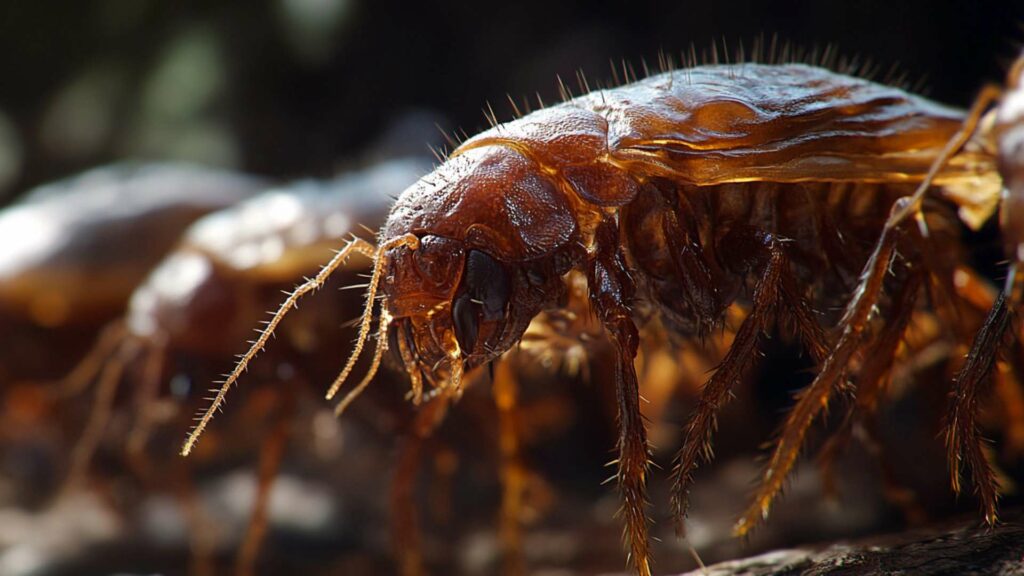
Lavender oil is not only renowned for its delightful floral scent, but it also has remarkable properties that make it an excellent choice for flea control. This versatile essential oil not only repels fleas but also possesses soothing properties that can benefit both pets and humans. When used as part of a flea prevention routine, lavender oil can help keep these pesky parasites at bay.
How to use lavender oil on pets safely
When using lavender oil on pets, it is important to remember that essential oils should always be diluted before application. To create a safe and effective lavender oil spray, combine 10 drops of lavender essential oil with one ounce of a carrier oil such as grapeseed or almond oil.
Mix well and transfer this mixture into a spray bottle. Before spraying the solution onto your pet’s fur, conduct a patch test to ensure they are not sensitive to the diluted mixture.
Additional benefits such as calming effects on both pets and humans
Beyond its flea-repellent qualities, lavender oil has additional benefits worth mentioning. This aromatic essential oil is known for its calming effects on both pets and humans alike.
The scent of lavender has been shown to promote relaxation and reduce anxiety in animals. Therefore, using lavender-infused products or diffusing the essential oil in your home can create a serene environment while simultaneously aiding in flea prevention.
Lemongrass Oil: Its strong insecticidal properties against fleas
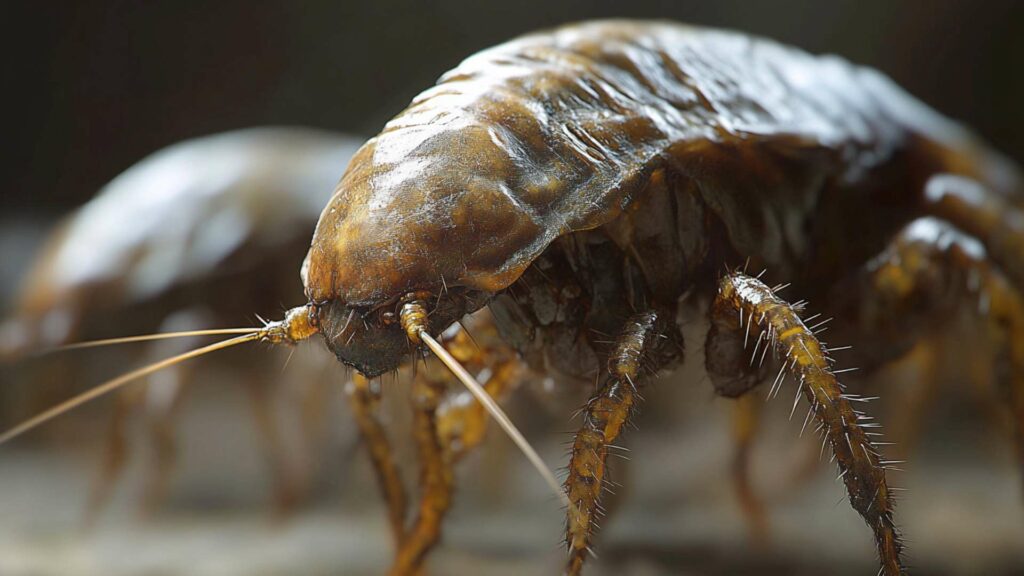
Lemongrass essential oil is another powerful weapon in the arsenal of natural flea remedies. With its potent insecticidal properties, lemongrass tea tree oil can effectively repel fleas from your beloved pets while keeping them safe from potentially harmful chemicals found in traditional flea treatments.
Proper dilution ratios for lemongrass oil application
To use lemongrass oil as a flea deterrent, it is crucial to dilute it properly. Combine 10 drops of lemongrass essential oil with one ounce of a carrier oil, such as coconut or jojoba oil. This diluted mixture can then be applied sparingly to your pet’s collar or added to a spray bottle filled with water for a gentle and pet-friendly flea repellent spray.
Potential side effects or precautions when using lemongrass oil
While lemongrass oil is generally safe for use on pets, it is vital to be aware of potential sensitivities or allergies. Always conduct a patch test before applying any essential oils to your pet’s skin.
Additionally, some experts caution against using undiluted lemongrass or lemon essential oil, directly on cats due to their unique metabolic system. It is best to consult with a veterinarian before incorporating any new flea prevention methods if you own feline companions.
Peppermint Oil: Its refreshing scent and flea-repelling abilities
The invigorating scent and potent properties of peppermint essential oil make it an excellent choice for repelling fleas naturally. Not only does peppermint smell delightful, but its strong aroma also helps deter fleas from infesting your pets and home.
Ways to apply peppermint oil in a pet-friendly manner
To utilize the flea-repelling abilities of peppermint oil, mix ten drops of the essential oil with one ounce of water in a spray bottle. Shake well before lightly misting your pet’s fur, bedding, and other areas where fleas may dwell.
Be cautious not to spray directly into your pet’s eyes or mouth. Alternatively, you can add a few drops of peppermint oil to a diffuser to spread its scent throughout your living space, acting as an additional line of defense against fleas.
Other uses of peppermint oil beyond flea control
Peppermint oil is a versatile essential oil that offers more than just flea prevention. Its cooling properties make it ideal for soothing itchiness caused by flea bites.
Additionally, the invigorating scent of peppermint can help alleviate headaches and promote mental clarity. By incorporating peppermint oil into your daily routine, you can enjoy its multiple benefits while keeping fleas and ticks at bay.
Lavender, lemongrass, and peppermint oils are popular choices when it comes to natural flea control. These essential oils repel and kill fleas more effectively while providing additional benefits such as relaxation, insecticidal properties, and refreshing scents.
However, it’s important to remember that essential oils should always be used with caution and properly diluted before application on pets. By exploring the world of essential oils for flea control, you can find safe and effective alternatives to traditional chemical-based treatments while creating a pleasant environment for both you and your beloved furry companions.
Lesser-Known Essential Oils for Flea Control
Eucalyptus oil: Its powerful repellent properties against fleas
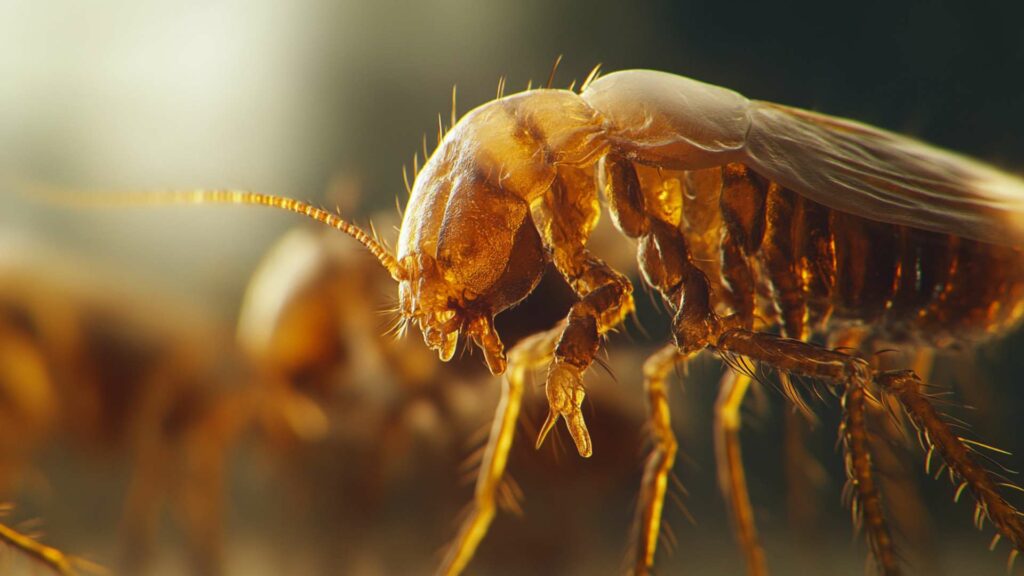
Eucalyptus oil, derived from the leaves of the eucalyptus tree, is renowned for its potent repellent properties against fleas. This essential oil contains compounds such as cineole and limonene, which act as natural insecticides.
When used in combination with other essential oils for flea control, eucalyptus oil can effectively repel these pesky parasites.
How eucalyptus oil can be used in combination to harness the full potential of eucalyptus oil as a flea repellent: it is often combined with other essential oils known for their anti-flea properties. One effective blend includes a few drops each of eucalyptus oil, lavender essential oil, and lemongrass oil diluted in a carrier oil such as almond or coconut oil. To create this blend, mix 10-15 drops of each essential oil into 2 tablespoons of carrier oil. Apply a small amount to your pet’s collar or bedding to repel fleas naturally. Remember to conduct a patch test before applying the mixture on your pet’s skin to ensure they do not have any adverse reactions. While eucalyptus oil repels adult fleas effectively, it does not kill them outright. Therefore, this combination should be used primarily for prevention and repelling purposes rather than eradication.
Conclusion
When it comes to flea control using natural methods, essential oils offer an effective and safe solution for both pets and households. While there are popular options like lavender and lemongrass oils that are well-known for their flea-repelling properties, lesser-known oils like eucalyptus oil can also play a significant role in keeping these unwanted pests at bay. When using essential oils to kill fleas, however, always remember to dilute them properly and perform patch tests to ensure your pet’s safety.
While essential oils for flea control are generally safe when used as directed, it is important to consult with a veterinarian if you have any concerns or if your pet has underlying health conditions. By incorporating essential oils into your flea control routine, you not only protect your pets from harmful chemicals but also create a pleasant-smelling environment.
Embrace the power of nature and keep those fleas away with the aromatic wonders of essential oils. Your pets will thank you for it!
Wipe Out Fleas with D-Termination: The Top Pest Control Service in Las Vegas!
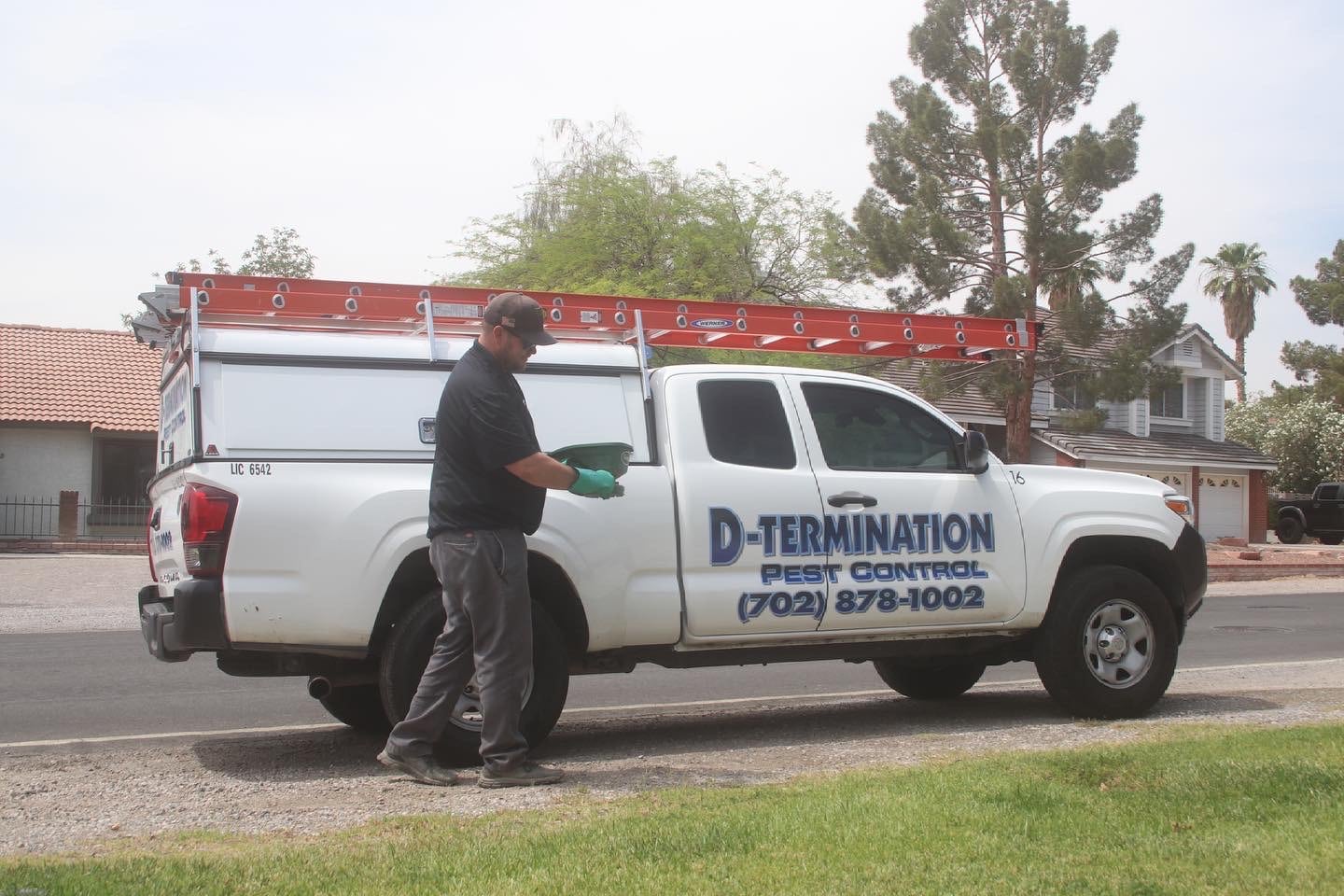
If you’re facing flea issues on your Las Vegas property, rest assured that D-Termination is ready to assist. Our skilled team specializes in eradicating flea infestations, ensuring the restoration of comfort and peace to your space. Bid farewell to fleas—opt for D-Termination for effective pest control today!
Get in touch with us at 702-919-6310 or visit dtermination.com to schedule your flea control service and reclaim your space from these bothersome pests.
Frequently Asked Questions:
Essential oils like lavender, eucalyptus, and tea tree are known to repel and eliminate fleas.
Combine water and essential oils like citronella or lemongrass to create a homemade flea spray.
A mixture of apple cider vinegar and water is a commonly used homemade flea killer.
Peppermint oil can help repel and deter fleas on humans, but it may not eliminate them entirely.







